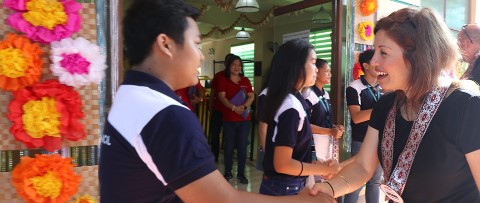- Thought Leadership


Susana Eshleman
CEO AND PRESIDENT
As we celebrate the 72nd anniversary of the proclamation of the Universal Declaration of Human Rights and Human Rights Day on Dec. 10, I find myself reflecting on the correlation between human rights, empowerment and poverty.
Here at Children International, the global humanitarian organization which I have the honor of leading, our supporters help 200,000 children in 10 countries across the globe. I am reminded today that humanity is an unstoppable force for good when we turn toward one another and not away from each other.
During a year of global pain and loss, it is important to recognize the selfless sacrifices and countless acts of generosity, kindness and decency that this crisis has brought out in people. I believe one simple impulse ignites all such acts of compassion: A deep desire to reduce suffering and increase well-being.
Creating a world with less suffering, greater opportunities and more widespread well-being requires all of us pitching in and pulling together, on numerous fronts. And there’s a strong argument to be made that the foundation for the better world we envision begins with protecting, promoting and ensuring basic human rights.
Although the connection between human rights and poverty reduction may not be immediately obvious, the link is definitive for this reason:
When people know about their rights, they are more likely to exercise them – and to demand and defend them when needed. Instilling the knowledge of basic human rights and nurturing the life skills and self-esteem needed to claim them are integral parts of Children International’s empowerment program.
When we equip young people with knowledge of their basic human rights and teach how those rights come with the responsibility of not just acting on them, but being accountable by changing their own lives and the lives of those around them, they create a better world for all of us.
Empowerment is one of the four pillars of our holistic approach to ending child poverty. The two key areas we focus on to measure success are “Life skills” and “Social responsibility.”

I see every day how small ripples of change can become powerful waves of transformation. This is true on both the individual level and on the larger, socio-political scale. Although we have an influential, long-term presence in the communities we serve, and sometimes work with governments to improve those areas, it is not always our place to challenge some of the structural and governmental dynamics that can perpetuate poverty, such as economic or education policies.
But citizens of those countries, when empowered and given the opportunity, can be agents for positive, wide-sweeping change. I’m inspired by the numerous stories of children and youth who pick up the mantle of empowerment. They motivate me to make sure we’re doing all we can to provide the tools they need to tap into their full potential. And the ability to fulfill that potential requires protecting, promoting and teaching basic human rights.
Comments
You must be logged in to comment. If you have an account, click here to log in.